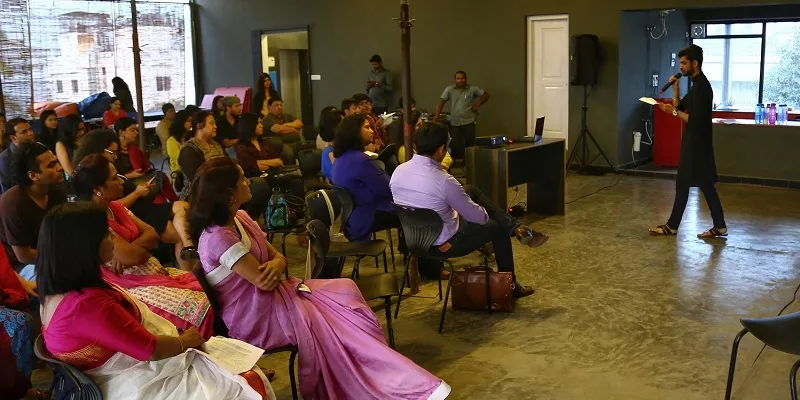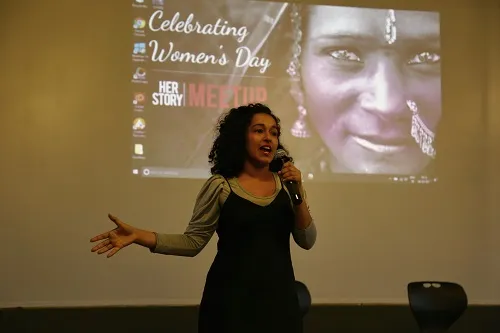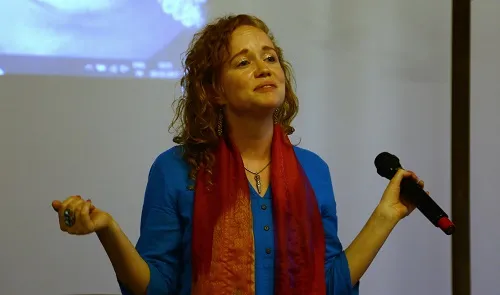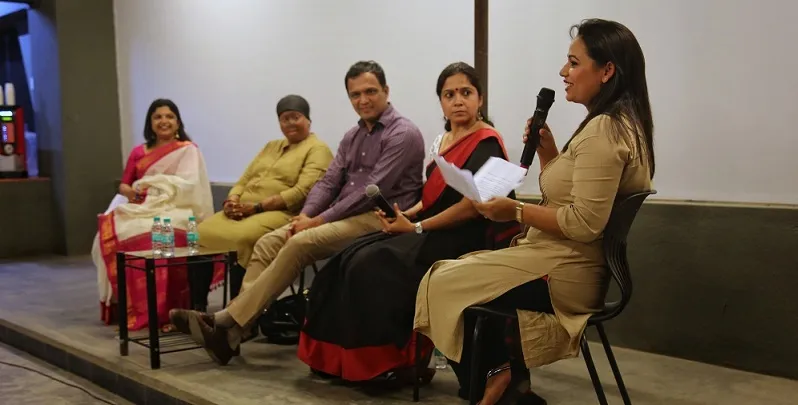Riddle me this — what is never black and white but mostly shades of grey?
We believe in speaking up, we believe in change,
For all revolutions were born from a conversation!
International Women’s Day comes and goes, and if it weren't for the token media mentions and retail discounts, it might not be noticed at all. That's why this year, we at HerStory decided to set aside the evening of March 6 to celebrate women in society — in literature, in the media, at workplaces, and in their homes — with a meetup of women, by women, for women.
As dusk fell and a gentle breeze cooled the air, a motley group of amazing women, and a few men, gathered for poetry and conversations on the terrace at YourStory HQ.

The theme of the evening was ‘Speak Up’ and the conversations centred around the importance of raising one's voice. The takeaway from the evening was that when it comes to women's issues, things are rarely black and white, they are mostly shades of grey. The meetup started off by recalling how way back in 2008 Shradha Sharma had founded YourStory, giving voice not just to budding entrepreneurs but also to thousands of women through HerStory.
The Fierce in My Family
Two women from different sides of the world, Kate Black-Regan and Nupur Saraswat, set the tone for the evening with their spoken word performance called ‘The Fierce in My Family’. They evoked the strong women from their families and the larger society and spoke about how women can build each other up and pull each other down.


A room of her own: Women's place in society
The panellists were Shalini Prakash, Principal at 500Startups, a global venture capital firm and accelerator based in Silicon Valley; Sandhya Mendonca, Founder and Editor-in-chief of Raintree Media; Nimi Ravindran, writer, theatre director, producer and co-founder of Sandbox Collective; and Sahil Kini, Principal, Aspada Investment Advisors. The panel was moderated by YourStory’s very own Dipti Nair.

The panel dedicated the evening to all the brave women who are speaking up, whether it is Gurmehar Kaur taking bullets on social media, or journalist Neha Dixit who received the Chameli Devi Award for courageous reporting, and gave a very inspiring acceptance speech on the importance of speaking up.
Nimi shared her views on why women still do not have access to safe public spaces. She recalled how women have come a long way in the fight to create their identities outside home and hearth — to work, to go out, to wear what we want, and live on our own terms — thanks to women of previous generations who fought for our rights. She also reminded the audience of how the struggle continues — women still face casual misogyny and must deal with judgements based on their choices.
Sandhya added her thoughts on how safety for women can become a reality only if women are not judged based on their outfits and superficialities. She exhorted a change in mindset.
Sahil, being the only man on the panel, spoke about how he was the epitome of privilege. A man, from a well-to-do family, hailing from a so-called forward caste, he enjoyed privilege based on his gender as well as socio-economic background. It took him a long time to realise how there was casual patriarchy in the way he used to conduct himself. In the workplace, women have proven themselves and have excelled everywhere from NASA to ISRO. He said, “Women bring in efficiency to the workplace since men often lack diligence and intellectual humility.”
Shalini shared her perspective of a woman in a sector which did not have a good gender ratio. She said, “If you are a young woman in investments, it is doubly difficult to be accepted since venture capital is still a boys’ club.”
Nimi spoke about issues like false dowry harassment or rape charges which lead to women being questioned on the veracity of their statements. She said that though such false cases might exist and there might be women who misuse the law for their personal vendetta, it is no excuse for women to suppress their voices or for every plea for justice to be viewed with suspicion.
Nimi said,
If a woman is raped, it’s not easy to report. In a prominent rape case, where the victim was assaulted inside a lift, a reporter with a leading newspaper described the victim as having ‘ambled’ out of the lift, hinting that since she did not run or shout for help, the accusation was cooked up. People react in different ways in difficult situations; some might go into shock. In such issues, there is always a nuance and things are never black or white.
Social media and women
To conclude the evening, there was a Hindi panel that discussed the topic of social media and women. The panellists were Padmavati Rao, actress, poet, writer; Manju Arif, Principal, Delhi Public School; Pragya Prasun Singh, Founder and Secretary, Atijeevan Foundation and acid attack survivor; and Sudarshan Rajagopal, Cyber Defence Leader, Shell India. The panel was moderated by Ranjana Tripathi.

The panel spoke on how social media has empowered women but is also a place where sexist attitudes get a voice. The positive of social media is that it can create awareness on issues like dowry harassment and female foeticide, and can be an ideal tool for the same if used well. On the other hand, there is even bullying and harassment of women and not even celebrities like Smriti Irani and Kangana Ranaut are spared by trolls. A panellist spoke about how women are bullied for having an opinion and a post on demonetisation saw mansplaining galore due to the assumption that women lack knowledge on the topic.
The evening ended with the hope that with each International Women’s Day that goes by, we move closer to a future that is safer for women and supportive of their aspirations.







